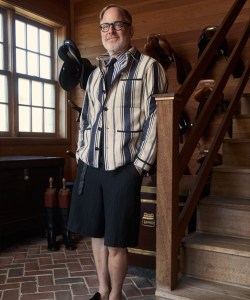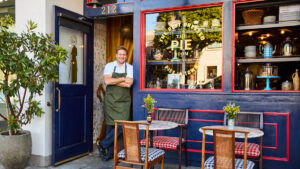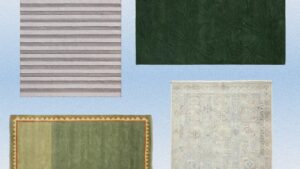The fashion world can have an inhospitable reputation, marked by cutthroat dynamics that make it popular film fodder. But that’s far from the reality, according to Bruce Pask, the senior editorial director for Neiman Marcus who has been living and breathing fashion since he was a boy growing up in Yuma, Arizona.
“It was a very wholesome, small town way to grow up, but I did feel isolated,” he tells Robb Report. “My parents would take us to get our school shoes in San Diego or Phoenix because we didn’t really have a proper shoe store for kids. And those trips to the mall were always fascinating to me.”
Pask’s mother would go on to open a children’s shoe store in their hometown when he and his twin brother were older. “My mother really encouraged our opinions and our points of view and she brought in shoes that we responded to. I always felt encouraged to have an opinion, and appreciated.”
From Yuma, guided by a religious dedication to reading the pages of GQ and in the heyday of The Preppy Handbook, Pask found himself at the College of William & Mary in historic Williamsburg. There, he worked retail jobs everywhere from Gap to Esprit in Washington, D.C.—and he loved his time on the shop floor.
Pask at a Ralph Lauren show.
Ralph Lauren
“After graduating, I moved up to the city with some friends and ended up getting a job out of the back of The Village Voice,” says Pask. “It was a recession, I had no aspirations of getting a high paying job—but I knew how to work a cash register. And I’d majored in Art History and minored in Economics, so I was always a combination of right brain and left brain.” That job happened to be as a stock person at Paul Smith and it served as a springboard into a world of fashion and commerce that Pask remains a leading voice in today. “Even to this day, working in editorial for a luxury retailer, it’s always been a [balance] of art and commerce. The perfect marriage.”
At Paul Smith, Pask became aware of what it meant to be a fashion editor. “I had no idea what a stylist was or a fashion editor was because those were not job descriptions that existed outside of the industry.” He remembers vividly when Ugly Betty premiered, exposing viewers to a world that had previously been behind the curtain.
Pask’s boss at Paul Smith recommended him for a job at GQ, where he stayed for just under a decade before going freelance. It’s an experience Pask says was akin to grad school, (he actually did enroll with NYU for grad school for a semester before leaving to focus on working). At GQ, Jim Moore “taught him everything he knows about clothing.” “I was from the middle of nowhere and I’d been on a plane just a few times for domestic flights,” says Pask. “There, I was exposed to so many amazing things, taking trips all over the globe with [Moore], learning how to direct photographers, models, and style, and how to get the best out of an image.”

Past straddling cocktail and casual attire with aplomb.
Bruce Pask
“I’ve had incredibly lucky intersections in my life where luck and timing and circumstance plays a part,” he says. But it’s not all about who you know—Pask’s reputation precedes him and speaking to Robb Report it’s clear why. He’s warm, humble, and incredibly generous with his time, spirit and candor. “You have to work hard and I was an incredibly hard worker,” he says of the relationships he built with Elizabet Saltzman, and Emily Babitz, who later introduced him to Annie Lebowitz. “She really expanded my understanding of character, costume, clothing, naturalism, and realism,” Pask says of the legendary photographer. “We were making imagery that wasn’t necessarily idealized in a glossy magazine, but more based on truth, and character, and person. And I was hooked. I was totally hooked.”
Pask worked on many iconic shoots, whether it was George Clooney at Lake Como or Hugh Grant for the cover of Vanity Fair. Stints at Cargo and T Magazine followed but it was a simple Instagram post by Aiden Kemp about his departure from Bergdorf Goodman that brought Pask back to where it all started: retail.
“I was looking at Instagram one morning [saw his post about leaving] and I reached out to the president who I knew just through fashion circles. And it was very very new, but also felt so familiar because it was the same vocabulary and lexicon and content but just in a dimensional way [in store] rather than in a magazine or website.”

In addition to the signature shorts, Pask loves a chore jacket.
Bruce Pask
Pask considers himself a commercial artist and defines his personal style as somewhat subdued, focusing on a limited palette of gray, navy and khaki and abiding by the principles of uniformed dressing. He is a longtime fan of the multipurpose staple: the chore coat (Le Mont St. Michel is a favorite, as are Zenga and Ralph Lauren). His go to shoes are a pair of Clarks desert boots or Wallabees.
“I’d rather spend my time thinking about other people’s clothing,” says Pask as he thinks about his role with Neiman Marcus as “prescriptive,” helping to create guardrails for shoppers who know they can trust their selection in store and online. When it comes to menswear, Pask says “there’s a sort of science or mathematics to it—adding or removing one piece can make or break the appropriateness of an outfit, just as specific tailoring choices can.”
Still, when it comes to style do’s, don’t’s, and “rules,” Pask says to take it all with a grain of salt: “It just feels so antiquated now because it’s like, who’s deciding?”

“I’d rather spend my time thinking about other people’s clothing,” says Pask.
Bruce Pask
The throughline through Pask’s career, he says, is a mutual respect among his peers. “It’s quite true that there’s a real friendliness and warmth across even competitive magazines and competitive retailers,” he says. “It just never has gotten in the way of caring and enjoying each other. I just found it always really kind of the antithesis of what people thought of as the fashion business, kind of the cliched version seen in media or maybe mythologized in pop culture. But I always found it warm and inviting and supportive.”
The other throughline for Pask? His signature shorts, which have been a must-have in his closet since a trip to Florence for Pitti Uomo years ago when he needed an item of clothing to help him beat the heat (his favorites are from Dries Van Noten and Lemaire). “Growing up in the fashion world I feel like I have license,” he says of the slightly unorthodox choice. “I’ve never worried about anything I wear – and I guess with the shorts and the way their fit is sort of an exaggeration, for me, I know my style is not that outrageous, it’s quite traditional in fact. And it’s all in the playing of each piece together which is where I find my originality.”
Pask says one of the delights of retail is helping people feel that permission to wear what they want and helping them recognize versions of themselves that they may need help discovering. It’s a levity and freedom of expression Pask embraces. “I do have to say, I get just the mildest of perverse pleasure of wearing my shorts somewhere. My team and I just went to a fair in Texas on Saturday and we really stuck out but that was fun, it was like we had our own little crew. It’s such a gas.”
Authors
-

Caroline Reilly
Caroline Reilly is a writer and menswear stylist based in New England. Her work has appeared in GQ, Vanity Fair, The Washington Post, and more. Her great-great-grandfather was FDR’s tailor, and she…
Credit: robbreport.com











